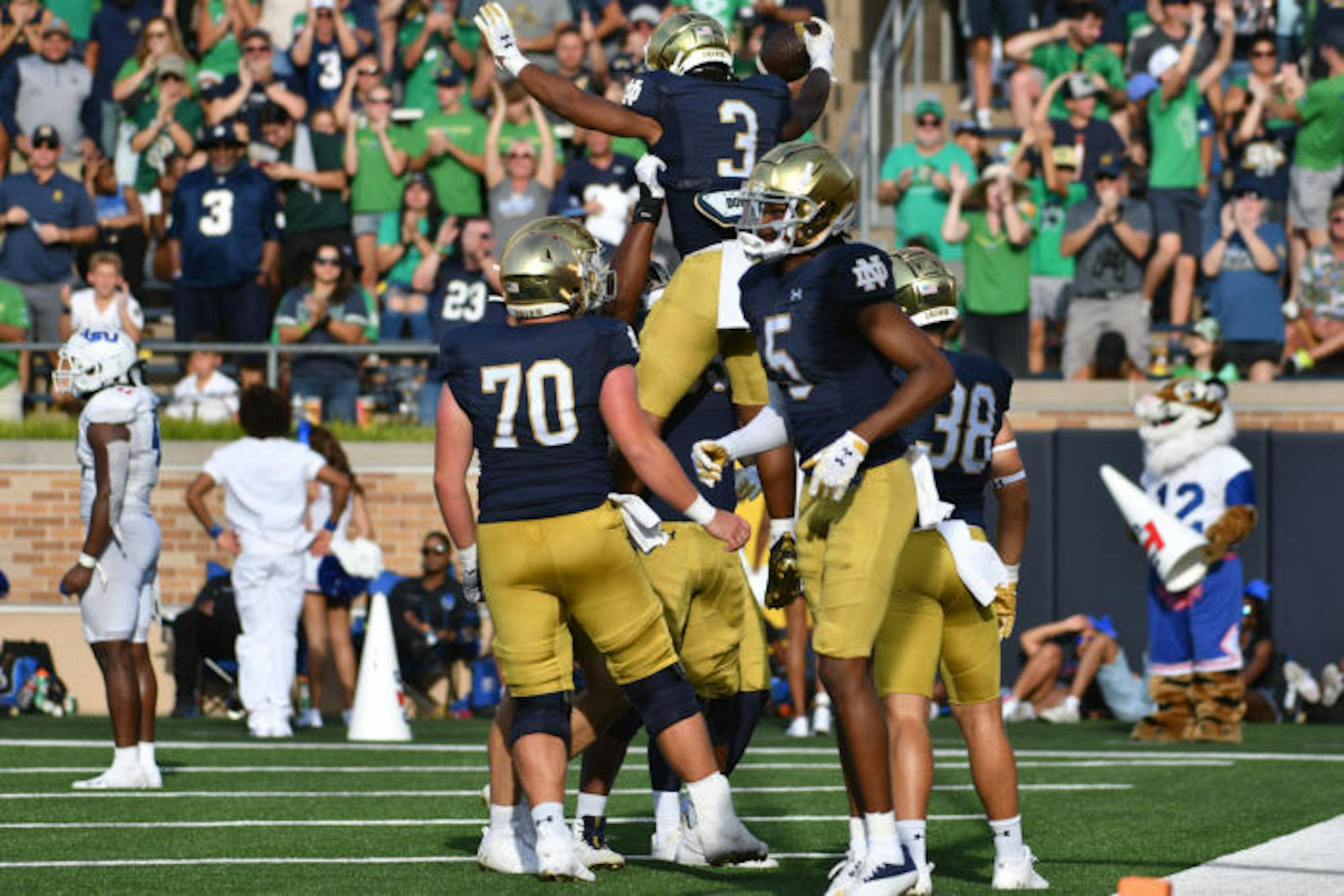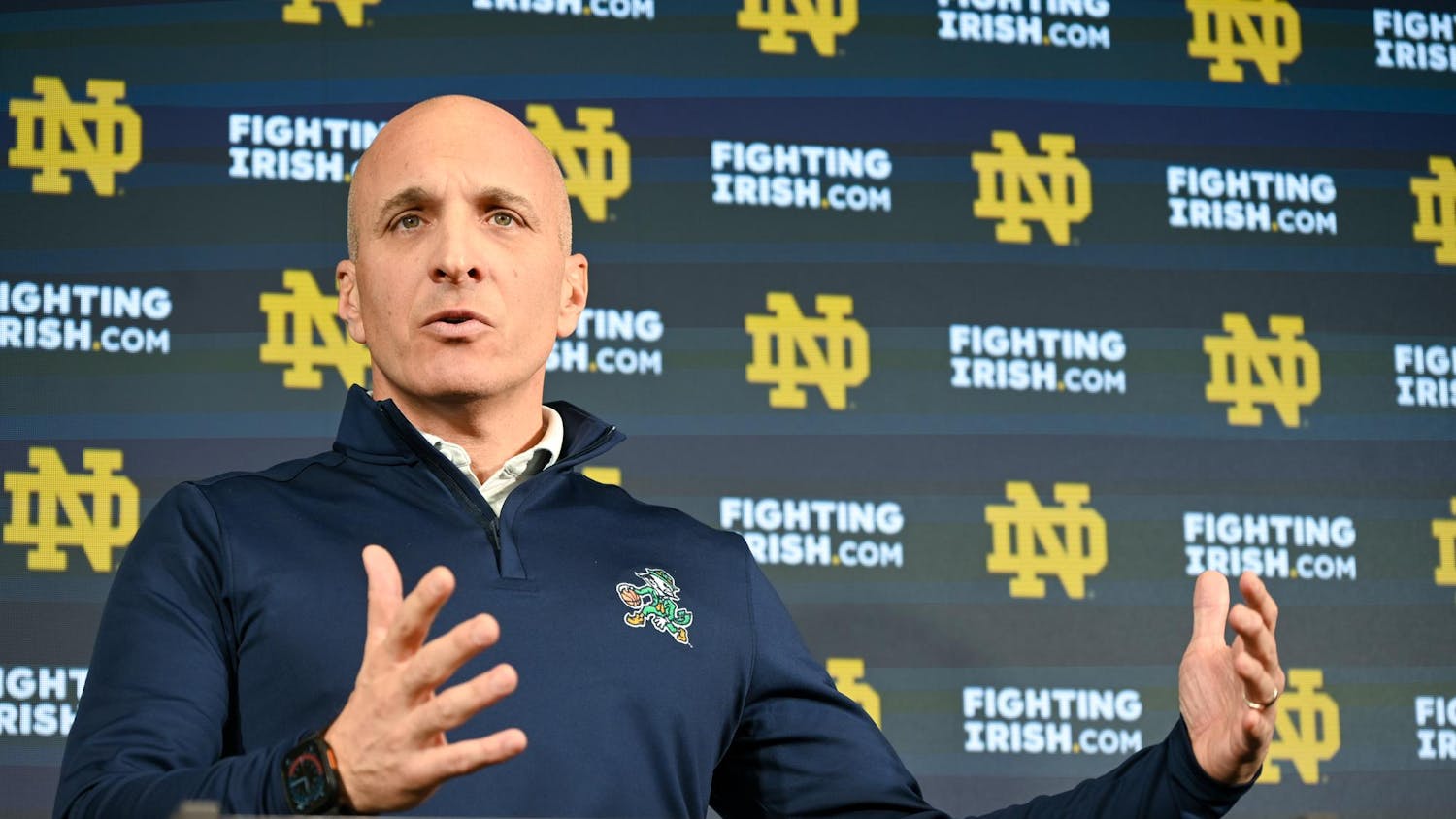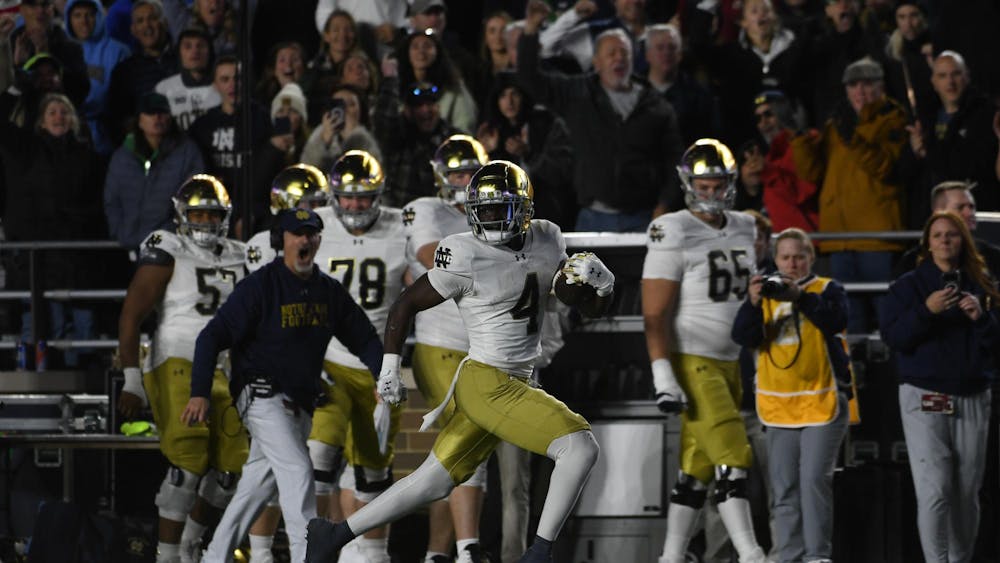 The Irish celebrate a late-game touchdown in the match against Tennessee State on Sept. 2.
The Irish celebrate a late-game touchdown in the match against Tennessee State on Sept. 2.
The 2023 regular season for Notre Dame football is over. The Irish finished the year 9-3 with some encouraging performances but frustrating lows. Our football beat breaks down the year that was and what might be to come.
What was the biggest surprise this season?
José Sánchez Córdova, Assistant Managing Editor: Audric Estimé’s Doak Walker Award snub. The Notre Dame running back was an absolute stud for the Irish this season. The Irish offense struggled to find consistency through the air with an inexperienced wide receiver corps but Estimé never slowed down. He was near the top of the nation’s rushing ranks all year and ran for 18 touchdowns in 12 games to set a new single-season record for Notre Dame. I don’t know if he would win the award, but his exclusion from the 10-man semifinalist group is a huge shock.Andrew McGuinness, Sports Editor: Just how dominant the Irish defense was. It was reasonable to expect a step forward in year two of Al Golden’s run as defensive coordinator, especially in the red zone. But there’s a big difference between merely being better and being top 15 in defensive touchdowns (tied for 6th), first downs allowed (13th), red zone defense (2nd!), scoring defense (9th), defensive pass efficiency (1st), total defense (8th) and turnovers forced (tied for 10th). They weren’t perfect, but the Irish were a team that went as their defense did.
Madeline Ladd, Associate Sports Editor: True freshman Jordan Faison — the lacrosse recruit and football walk-on that went on to become a scholarship wide receiver. With 14 receptions and 3 touchdowns this year, he was a reliable source in the wide receiver group that struggled with injury and youth. His combination of speed and quickness also made him an immediate weapon. He showed improvement throughout the season, the biggest being his ability to read the defense and adjust his routes accordingly.
Matthew Crow, Associate Sports Editor: The tight end unit was expected to take a step back after losing an all-time great in Michael Mayer but instead served as a key element of the Irish offense. Junior Mitchell Evans was Sam Hartman’s top target for most of the season, and when he went down with injuries, sophomores Holden Staes and Eli Raridon did not miss a beat. Staes broke out with a huge 115-yard, 2-touchdown outing early in the year against NC State, and Raridon tallied 39 yards and a score in his first real action against Wake Forest. All three are capable of playing big roles in the passing game next season, and it’s become clear that the Irish will continue churning out star tight ends on an annual basis.
Who Took the Biggest Step Forward?
Sánchez Córdova: Xavier Watts is the clear choice here. His journey from wide receiver to Bronko Nagurski Trophy finalist is remarkable. At times this year, he’s been the most impactful player on Notre Dame’s formidable defense. His penchant for forcing turnovers this year helped the inconsistent Irish offense too.McGuinness: Rico Flores Jr. seemed to me like the least hyped of Notre Dame’s three four-star freshmen wide receivers. However, he finished the season with the most receptions and second-most receiving yards of all Irish wideouts. What was most encouraging about Flores was his ability to succeed in different areas. He had seven receptions of at least 20 yards and also came through in short-yardage situations, making key receptions for a touchdown against Ohio State and a two-point conversion at Duke.
Emily DeFazio, Associate Sports Editor: Xavier Watts is the clear standout of the season - having the most interceptions of any player in college football and earning award after award every week just cannot be overlooked. While he contributed in every game last year, the way he, at times, had more impact on the outcome of the game than any other player on the field this fall shows leaps and bounds of growth. He will have a difficult decision going forward as his NFL draft stock rose rapidly this season.
Most Important Offseason Move to Make
Sánchez Córdova: The transfer portal is immensely impactful, but finding a permanent strength coach is the most important move for Notre Dame in my opinion. Matt Balis’ unexpected resignation in July left the Irish with Fred Hale as an interim coach for the season. Finding a replacement will be paramount for Marcus Freeman this offseason. Getting it right will be essential for the program’s success in the long term.McGuinness: Finding the next Javontae Jean-Baptiste and Thomas Harper. The Irish hit home runs on the former Ohio State defensive lineman and Oklahoma State safety, respectively, as graduate transfers. This doesn’t necessarily mean replacing those two players specifically — the Irish have great secondary depth, for example. While everyone will be focused on the quarterback situation, transfers at other positions can make a huge impact. Kaleb Smith not retiring from football prior to the season wouldn’t have saved Notre Dame’s receiving core, but it shows the cost of coming up empty in the portal.
J.J. Post, Associate Sports Editor: Wide receiver and offensive line stand out as the two areas the team most obviously will need help in, though I think you can fairly argue that the Irish need upwards of seven new starters in the portal. Wide receiver is obvious: The departure of Chansi Stuckey means what little production Notre Dame had in the passing game is quickly evaporating. They don’t just need proven talent — they’re starting to need scholarship bodies outright. Offensive line is trickier. No doubt there’s a lot more young depth in that room compared to other Irish position groups. But how many young linemen does Notre Dame want to start next year? It’s possible the Irish head to Texas A&M for their opener next year without last season’s starters at both tackle spots and center. And neither of 2023’s starting guards, Rocco Spindler and Pat Coogan, had seasons that would be cause for building around them. Linemen will be at a premium in the portal, but finding an experienced, high-level starter would be huge for Notre Dame.
Crow: Wide receiver and safety are two positions that the Irish should look to shore up in the transfer portal. The future prospects of Notre Dame’s young receivers look extremely promising after their breakout performance against Wake Forest, but the unit had a severe lack of depth this season, and the Irish offense was hampered by receiver injuries for much of the year. Adding an experienced transfer into the mix could solve some of those issues. Defensively, Notre Dame will be losing a lot at the safety position and could use one or two proven players with the ability to step in and find success — on the field and as a leader — from day one in the same way that graduate transfer Thomas Harper seamlessly has this season.
Was The Season a Success or Failure?
Sánchez Córdova: I can’t help but feel disappointed about this season. The addition of Hartman had everyone dreaming big, and the Irish fell short. The fact that a team with a top-10 scoring offense and defense lost three games is disappointing too. While it was a successful step forward for Freeman in Year 2, this was a failure after such a promising start to the season.McGuinness: I’m sorry, and maybe I’m just being harsh, but I lean toward the latter. Opportunities like the one Notre Dame had against Ohio State don’t come around every year. A quarterback with the pedigree that Hartman had isn’t going to be your signal caller every year. Even the most talented defense would have a hard time putting up better numbers than Golden’s unit has. To have all of those things and not even make a New Year’s Six bowl, especially when two of the three marquee opponents turned out to be duds (one of which Notre Dame still lost to), is a disappointment. The good news: It’s certainly not a failure that Freeman, and the Irish can’t come back from.
Post: This is a weird one to answer. I don’t think I can say it was a success. The Irish indeed improved on Freeman’s first regular season by one win. Vegas expected Notre Dame to win 8-9 games. They did exactly that. The cataclysmic meltdown against Louisville was the only outright, all-around “bad” performance, and certain areas of the roster (namely, basically everywhere on defense and tight end) showed very real signs of progress. But at the end of the day, when you miss a chance to earn a landmark win at Notre Dame Stadium in the way the Irish did against Ohio State, and you miss a New Years’ Six bowl with more than enough talent to qualify for one, the season isn’t a success. All of that being said … I personally predicted in the start-of-season roundtable a 10-3 record with a bowl game win, so maybe this season was just average?
DeFazio: This is such a loaded question, and, as with most things, I feel the answer lies somewhere in the middle. The Irish had a taste of greatness at the start of the season, and I think that being in a position to have hopes of a CFP bid was a benefit. Clearly, there is talent on the team and, clearly, if it is organized correctly, Notre Dame can be a formidable team. Whatever people say about Hartman’s contributions to the program, he was a much-needed breath of fresh air on offense. However, only tasting greatness is not the same as actually achieving it. The theme of this season has been the reminiscing on the “what could have beens” and “what ifs” that should have been tangible results. There is no way to call this season a complete success for that very reason, especially when there were such high hopes of a veteran quarterback leading Notre Dame to a playoff showing.
Ladd: The Irish showed growth this year, but anything less than a playoff appearance for this team has to be considered a failure. Veteran Sam Hartman was brought in to compete for the national title, and that definitely didn’t happen. While the defense improved tremendously over last year’s squad, the Irish offense never truly found their identity and struggled on the road despite the superb play of juniors Audric Estimé and Mitchell Evans.
Crow: For me, this question hinges largely on the outcome of Notre Dame’s bowl game. While the Irish entered the season with playoff hopes, I find it hard not to consider a 10-win season and an improvement over last year a success. Even with a bowl loss, failure seems a bit strong. Notre Dame was dominant at home throughout the season and saw significant growth from a lot of players, particularly at the skill positions on offense. A repeat nine-win season would no doubt be a disappointment but would still leave the Irish well-positioned to take a major step forward next fall.
Sign up for our Observer Sports newsletter!Have an Irish sports question? Ask it for our Observer Sports mailbag!








